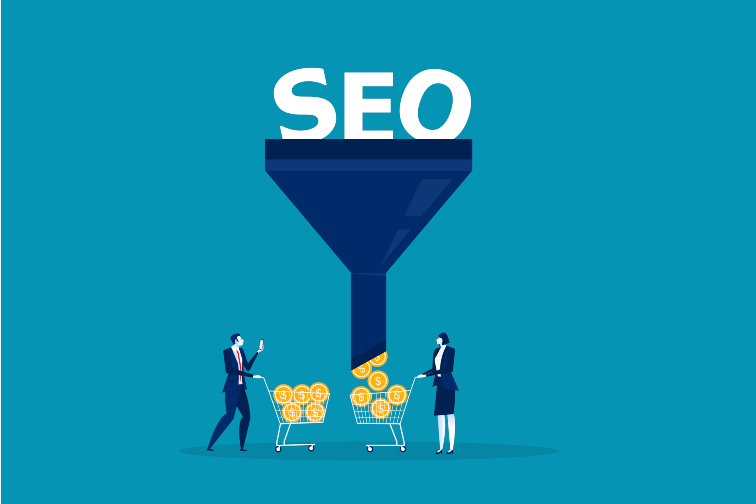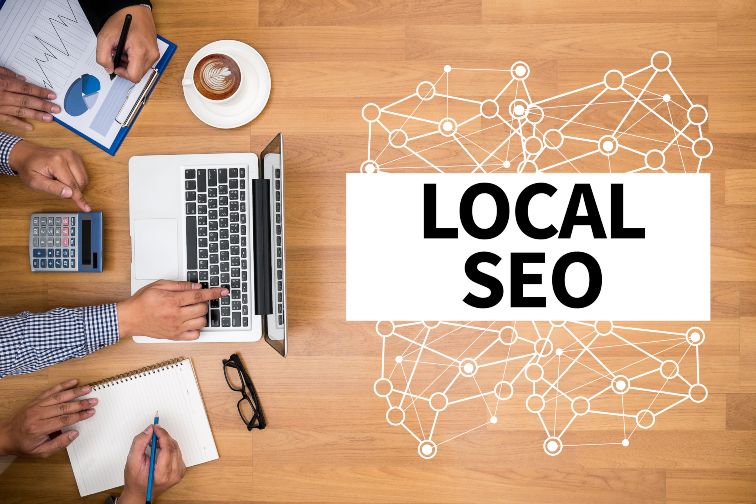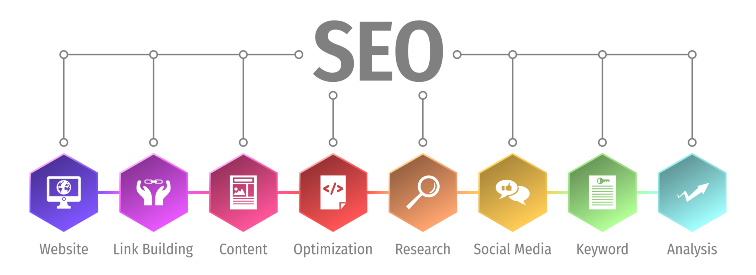Introduction to SEO
Search Engine Optimization, also known as SEO, is the process of optimizing or improving a website so that search engines like Google can easily match the relevancy between what a web page is about and the context of a user’s keyword search. To make your website more visible you have to improve relevance and authority or in simple terms rank it as high as possible on Google’s results page. The reason for this being important to you is that the more times your site is found the more likely it is to generate more visitors to your website. That visit can now convert into a lead, sale, or another desired result. One may ask how do you achieve this? The challenge: there are billions of websites published online and competing for this space. To optimize your website for Google specifically, you need to follow a set of ranking factors that help you boost your site’s visibility in a SERP (search engine results page).
The Google algorithm has its own periodic updates and that is why it is very important that SEO specialists are always up to date with these changes so that they can be proactive and avoid spoiling their results.
Clean code (easy to read and maintain code), a technically sound website, and SEO-friendly content (text, images, and video Google likes) are all essential for this success to be obtained. It’s good practice for one to be doing this on a recurring basis to make sure their website has all of the above factors in place.
How can SEO help your business?
The primary benefit of SEO is driving unpaid or organic traffic (as it’s called in the industry) to your website.
One of your main goals in promotional marketing is to increase your company’s exposure and recognition and having a website that people can discover on search engines (which are essentially digital libraries and directories) is essential to your company’s success.
If increasing relevant traffic to your website is important then SEO can continuously help you since it can direct Google users to your site around the clock and doesn’t require a daily advertising budget. From a broad perspective, making it convenient for visitors to locate your website by making it stand out is vital. People are more likely to visit your site as a result of SEO efforts over ads or social media.
Additionally, SEO aids in establishing the credibility of your company. Your brand’s trust improves when your websites rise in search engine rankings and become more visible on the internet. With that being the case, including SEO in your website strategy should be one of your primary objectives.
Providing your users with an enjoyable and consistent experience helps build your reputation and credibility over time. With SEO, you’ll need to invest time, money, and effort to build the value of your brand. An increase in the number of clients you may attract as a result of SEO is a result of building your brand’s value.
Why is SEO important?
The higher you rank, the easier it is for people to find your website which means more opportunities for you to get potential leads.
Search engine optimization (SEO) is important because it gives you access to a diverse range of customers who are looking for information and products or services like yours. By implementing an SEO strategy, you’ll reach audiences all over the world with different languages or locally. If you want to grow your business, great search engine optimization (SEO) is a must.
For a strong SEO presence on the internet, it is also important to hire an SEO professional or a proven SEO agency for the best results. EM360 SEO agency from Detroit offers complete SEO services, from strategy to implementation as well as continuous work on your SEO for your website.
Setting SEO objectives
The first step to SEO is to identify objectives for your website. These objectives should be the broadest form of what you want your site to achieve. You may want more traffic, more leads, or more sales. Once you’ve come up with these objectives, it’s easier to drill down to a strategy where you have identified clear goals and KPI’s to identify success or failure. When creating an SEO strategy, it is important to perform detailed keyword research to determine the keywords or phrases that you want to rank well for. It is also very important to explore competition. Here are a few questions to consider when creating your strategy.
Who is our competition?
Where are they in SERPs?
What are they doing when it comes to SEO?
The best SEO strategy is made when all these things are included.
What is local SEO?
Local SEO is a type of SEO optimization that allows websites to be more visible in the local section of search results. Google distinguishes users who search for local keywords from those who search for generic ones. As a result, they developed a special kind of search – local search.
Local SEO is based on the search of local keywords and local results, the so-called local 3 pack. Local keywords are all those KWs or phrases that contain a location (city, part of the city, etc.). The Local 3 pack is a list of 3 organic results at the very top of Google search. Besides its title, these results contain a short description, some useful information, and of course the geographic location on a map.
Google’s algorithm works differently when it comes to local SEO and regular SEO. That’s why it is extremely important to define the goals of the SEO campaign in order to know which type of SEO optimization you should pursue.
The three pillars of SEO
Understanding how SEO evolves can help keep you on top of your marketing game. Despite the fact that SEO is always evolving in subtle ways, the core concepts of the field remain constant. If you want to get a handle on SEO, we can divide it down into three main components:
Technical SEO
The term “technical optimization” refers to the process of performing tasks to your site that are not directly linked to content, it frequently occurs behind the scenes in your code and server. In order to achieve the best results with on-page and off-page optimization, it is extremely important that technical SEO is well addressed.
On-Page SEO
To improve your website’s search engine rankings, you must first optimize or enhance it. On-page optimization includes all optimization actions on your website.
On-page optimization, also known as on-site optimization, has many elements. The most important on-page factors are having a good title tag, meta description, URL, and good image optimization as well as h1 tags. Providing internal links on your pages also helps both the user and Google to easily navigate through the site. Internal links are an important part of on-page optimization too. Additionally, it’s important that your site has an SSL certificate to have HTTPS protocol (secure HTTP).
Off-Page SEO
If your website has moderate to the big competition you must include off-page SEO in your SEO plan too. The term “outside the website” refers to any action that has the potential to improve your site’s search ranks in Google results.
Blogging, social networking, and press releases are all examples of off-page SEO. You may increase your off-page SEO efforts through several different means.
However, not all off-page SEO strategies are made equal. Some methods of off-page SEO may be more effective than others. For this reason, you should always do research on the competition’s websites to establish which strategies will be most beneficial to you.
Linkbuilding
Building your authority on the web is a crucial component of SEO success. What’s the secret to doing that? Backlinks. Linkbuilding is one of the main off-page activities. Backlinks give Google a signal that your website has support from others websites related to yours and that they like it. If those backlinks come from websites with good authority meaning a solid reputation, Google can raise your authority too.
How to Achieve Website Accessibility?
It’s important that your website be simple to use and to provide the best user experience. It will become more accessible to search engines because they are looking for high-quality websites with content that satisfy a user’s search intent. There are many factors that Google takes into consideration, but the loading speed of the site, mobile usability, and of course quality content are the most important indicators of a good user experience.
Most visitors will come to your website if it is accessible on the first page of the search engine results (SERPs) and as a result of achieving this, the volume of individuals who click on the website’s link will increase. Greater conversion may be also achieved by increasing the number of visitors that come to your site.
Encourage your consumers to get in touch with you by providing a contact form or a live chat option on your website. Include a button on your website with a “no-follow” link to your social media accounts so that people can quickly connect with you there. These interactions with potential customers help you establish trust, which may lead to sales in the long run.
SEO vs SEM
While SEO depends on organic search tactics to generate traffic, SEM requires a financial investment paid directly to a search engine and relies on a paid advertising budget. Using paid advertising to boost a website’s search engine rankings is known as search engine marketing. SEO, takes time, whereas SEM is an instant result. Finally, the results of investing in SEO can last months even possibly a year after implementation, whereas SEM results disappear as soon as your allocated budget depletes.
Search engine optimization (SEO) is a strategy used by website owners to improve their site’s visibility in search engine results pages (SERPs). Search engines reward websites that match the intent of a user’s query. are easy to use and offer high-quality material. As a result of ranking organically, the SERP position a website receives is free. Search engines need (free) relevant organic results to motivate users to see value in their paid-advertising services.
SEO and SEM have a number of other distinctions, such as:
- SEM results display to a user as advertising, but SEO results do not.
- SEO results have highlighted snippets whereas SEM results have ad extensions.
- In SEM the owner of the website pays for each ad click. But when a person clicks on an organic result link on a website, the website owner has no costs.
- SEO activities have a long-term impact on a website. SEM is instantaneous and there is no long-term benefit from SEM.
What are the advantages of SEO compared to PPC?
Compared to a pay per click campaign, organic search engine optimization is a more cost-effective digital marketing method. SEO, when done effectively, should cost you significantly less than setting up and administering paid advertising campaigns.
The goal of organic SEO is to produce results that will last for a long time. An optimized website can maintain its high ranking in search engine results pages even after PPC-sponsored advertising has been discontinued.
PPC ad rankings are constantly shifting based on your rivals’ bidding strategies, but search engine positioning is more stable. Even if you ignore SEO tactics on your website for a month, it can still be able to maintain its search engine rankings if it is well-optimized.
Trust and reputation are built through organic search engine optimization (SEO). Having your site show up in organic search results gives you a leg up on the competition because many people avoid advertisements in favor of organic results.
Increased CTR or (Click-Through-Rate) can be achieved through organic search engine optimization (SEO). In most cases, a well-placed organic listing is more likely to produce clicks than a sponsored ad.
What are the drawbacks of SEO compared to PPC?
SEO results are a lot slower than PPC. When you improve your site, it may take months before you start seeing results, whereas PPC can start generating leads right away.
If you want to improve your search engine traffic, you’ll need to keep up with Google’s algorithm changes.
SEO is a process that never ends. As you devote more time and effort to your website, it will only get more and more “optimized.”
Consistency is essential for SEO. In order to get the best organic search traffic, you can’t just put in a few weeks of effort and hope for the best. To get results, you need to put in the time and effort on a regular basis.
If you decide to pay for advertising, EM360 digital marketing agency from Detroit offers you complete PPC services.
Content Is The King?
The phrase “Content is king” is not 100% true. Is it important that a site has the quality and optimized content for Google? Yes, of course, but it’s not enough for a good ranking. This is especially not the case when it comes to extremely competitive niches where search engines rely on domain authority and your back-link profile to determine page rank.
How does Google see the content?
Google doesn’t understand the meaning of the text. It recognizes and quantifies keywords and looks at semantics and context. Not only does an SEO need to make sure their text is clear, concise, and informative to their target audience it also needs to be optimized for Google.
The basic elements of content optimization are:
- keyword research,
- content-length,
- keyword density,
- optimization of tags,
- content formatting,
- internal links, and
- featured snippet.
Including all of these elements above, in your content can help rank your website for more keywords which will in effect increase the visibility and traffic of the site.
How Long does it take for your page to rank?
We can’t stress this enough; SEO is again a long-term approach. What makes SEO worthwhile is when your site appears on the first page of search results for the keywords you’re trying to rank for.
Google’s top 10 positions often take between six and twelve months to achieve. However, this does not rule out the possibility of seeing your website on the first page much sooner. It mostly depends on the algorithm, and how much competition there is for the keywords that you and your competitors are trying to rank for. For instance, after only a few weeks or months of hard work on your website’s SEO, you may discover that your site is ranked for new keywords, which automatically leads to increased visibility on Google. You can also notice an improvement in rankings for certain keywords you already ranked for.
It’s worth the time and effort to reach the top of Google’s search results page organically because it is the number one way people do research these days. In the end, it’s not that simple! On the other hand, if you want your business to be successful online, you may have to find ways that may be difficult for you or your competition to be more successful than them. SEO is a wise investment!
Wrapping up
Search engine optimization (SEO) is not a simple undertaking. A website cannot be created by just clicking a button or entering your domain name and hosting provider’s information. At all times, your website must be optimized (better) and advertised.
SEO requires a lot of time, patience, and perseverance. It may take time to see benefits, but if done correctly, it may have a long-term impact on your website and your business.
Get a consultation and estimate from SEO experts today, in order to scale your business to the top.









